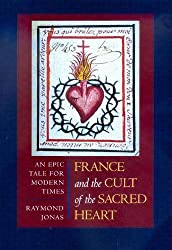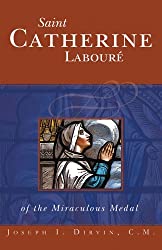
It cannot be helped. After visiting Loublande, this must perforce be the most personal of reviews.
For speaking very personally, Loublande changed many things for me.
But among others, it changed my perspective on this book.
And what is Loublande? Loublande is a small village at the edge of the Vendée in Western France, where once Claire Ferchaud reported visions of His Sacred Heart during World War I, the so-called “War to end all wars”.
Now the author Raymond Jonas is hardly Catholic. At least, he is not a Catholic of faith. His writing rather strikes me as infused with the sort of Freudian reductionism, which is now de rigeur in the humanities. So Jonas is naturally sceptical of the claims of Claire Ferchaud.
And I was sceptical as well. Before I went to Loublande, at any rate.
This was not because I shared Jonas’ creed of psychologism and all its articles of faith.
Rather, it had more to do with the fact that in 1920 the Vatican withheld approval of the visions of Claire Ferchaud.
Yet as someone explained to me in Loublande, Claire Ferchaud was also assured within the Vatican that her visions were never condemned. And for long decades, Popes appear to have given Sister Claire in Loublande a special solicitude.
Sister Claire: a humble young peasant near the Vendée, whose visions of the Sacred Heart would propel her most improbably to an audience in Paris with the President of the French Republic. And for what reason? To call the President to place the Sacred Heart of Jesus on the flag of France.
The Blue, White and Red French tricolour – the President listened as the twenty year old peasant explained that there, in the central white band, should be the Cor Jesu Sacratissimum …
Jonas’ book tells this strange story. And I cannot help but lament but the skewed, materialistic slant it frequently takes. Not simply with Claire Ferchaud, but the motivation of many other Catholics in the story is simply reduced to psychological or sociological considerations.
Some traditional Catholics may well be offended, then. Jonas never seems to be able to get out of this box. For instance, he suggests Claire’s attendance of daily Mass as possibly rooted in social needs.
It never even occurs to him that not only saints, but even very ordinary Catholics can be hungry – hungry for the spiritual experience of the Eucharist. It becomes a daily need …
There is not the slightest acknowledgement that a Transcendent Reality might have been at work in Loublande.
This is not to suggest ipso facto that everything the still very young Claire Ferchaud reported in the Great War was infallible.

However, neither is it to swing to the other pole – where everything to do with Loublande can be explained away by ultimately materialistic reasons. Psychological phenomena, which is then reduced to electrical phenomena of the brain …
Can an author lacking a transcendent perspective write anything of use on this topic?
Well, actually, yes. To give Jonas credit, I believe he is genuinely sympathetic to Sister Claire. Certainly, he is not writing with any conscious agenda to discredit her. He just cannot free himself from the constraints of the modern academic-box world.
Moreover, his book is well researched. He is a terrific writer in fact, capturing so many images, details and forces so neatly and so vividly.
When it comes to observing the ordinary events of out world, he is actually capable it seems to me, of a very penetrating imagination.
Thus for example, he powerfully recreates Claire’s trip to Paris in the grim conditions of the first World War, with its rations, its closures and its lights dimmed to prevent bombardment from the zeppelins …
And he shows us how all this must have seemed to Claire Ferchaud. He observes for example, how she regards indoor potted plants in Paris, noting that this was possibly the first time in her life that a peasant girl would have seen such a thing. Indeed, the book often sparkles with gems such as this.
But not only does Jonas evoke the strange tale of Claire Ferchaud, he also evokes that far-away world of Catholic France, which was crumbling even then, under the pressures of the war and the hostile anti-ecclesiastical Third Republic.
For someone like myself who treasures Catholic France, this book has been a real gift. Jonas serves to recall my mind and soul to a Catholic France, which was not obsessed by modernity, which was truly defiant in its counter-cultural stance, which was ready to fight for the Catholic culture being crushed by that outrageous Third Republic.
For Anglophone readers unfamiliar with that lost, Catholic France, reading Jonas might seem like science fiction. Boldly going to a strange, new world. Weirder even than Star Trek. For truth to tell, Star Trek with its mirings in Anglo-American twentieth century secular and scientific materialist values is likely to feel much less foreign than Catholic France …
That such a book can help us see beyond contemporary culture is well and good, I think. How many of us are bounded by the horizons of the twenty-first century Anglophone values!

Here with Jonas we can take a voyage into a world not yet even a hundred years old, but a world where people think and act and feel so differently to today. Their world is still so oriented to the Vertical and Transcendent. Very different things are important to the Catholic French of this era than the materialistic culture of our contemporaries.
And seeing how such a relatively recent people were so different from our own may help us to imagine different horizons for our own troubled culture – to break out of the box.
Alternatively, readers might like to begin with the author’s previous book, which so powerfully evokes this lost world: France and the Cult of the Sacred Heart, which I have also reviewed here.
In any event, Jonas writes very perceptively and evocatively of this lost France. Here for instance, is how speaks of the Vendée, the region which shaped Claire:
When Claire went to school, she probably took with her a keen sense of herself as a Catholic in the West of France. Such a sensibility was virtually a birthright of anyone born there after 1789 when … the Revolution [had met with] religious and political dissent, and ultimately civil war known by the name of the region in which it was fought – the Vendée.
The Vendéen counterrevolutionaries had some early successes and over the next couple of years its armies of adherents grew. The most common symbol of their cause was the Sacred Heart emblem, which, when affixed to jacket or lapel, served as both insignia and protective talisman in battle …
Republican armies struck back in 1793-94, smashing opposition to the Revolution in villages like Loublande across the Vendée.
When the armies of the counterrevolution had been destroyed, republican troops went after the population and resources that had sustained them … Entire villages [were] razed and tens of thousands of lives had been lost.
Memory of the brutal repression of the counterrevolution would mark the region for generations …
Claire’s schooling could only have deepened her consciousness of the local tradition of counterrevolutionary politics. The Sisters of the Sacred Heart, a teaching order marked by its clandestine origins in the French Revolution, offered instruction … at Loublande.
Foreword for Monarchy by Roger Buck
Yes, Jonas’ analysis of history and society is frequently very acute. Yet once more, the traditional Catholic must be on guard reading this book. For Jonas cannot himself but regard Claire in terms other than delusional. His worldview will permit nothing else …
But before Loublande, I felt more sympathetic to Jonas’ take. And the Vatican response concerned me greatly.
In Loublande I learned things that put the story of Claire Ferchaud in a different light than it is presented here. Yes I want to encourage caution with this book – but not avoidance.
For those who cannot read French, this book really can act like a passport to an extremely unusual “planet”.
And if you take the journey with Professor Jonas to that strange long ago world of Catholic France, the likes of which may startle you – be careful, dear Reader. Not all is as it appears in Jonas’ telling.
Loublande shook me. As I write these words, I am still digesting my experience there. In time, I may want to say more at this site about Claire Ferchaud and that strange haunting place wherein she beheld His Sacred Heart. In time …
For the moment, I have said just a little more here, which might be read in compliment to this review …
Foreword for Monarchy by Roger Buck
Buying Books at Amazon Through These Links Gives Us a Commission. This Supports Our Apostolate. Thank You if You Can Help Us Like This!








Comments
comments are currently closed
2 responses to “The Tragic Tale of Claire Ferchaud and the Great War by Raymond Jonas (Review)”
[…] Cor Jesu Sacratissimum HomeDedicationAbout UsKim's WeblogRoger's WeblogWebburstsReviewsArticlesUK StoreUS Store « French Fragments: A Cryptic Travelogue for Any Who Care to Listen (Part XI: The Vendée) Book Review: The Tragic Tale of Claire Ferchaud and the Great War – Raymond Jonas » […]
Real knowledge, like everything else of value, is not to be obtained easily.
[…] age, has spent years of his life in writing and researching this book (as well as a follow-up on Claire Ferchaud, reviewed here), years turning his attention to such a different world than our own. The buried, bygone world of […]